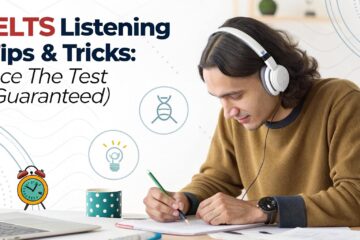Are you dreaming of studying abroad or landing that dream job that requires you to speak fluent English? If so, the IELTS (International English Language Testing System) exam is probably on your radar. But let’s be honest, the thought of expensive coaching centers might make your wallet weep. Good news! You absolutely can ace the IELTS exam with effective IELTS preparation at home. Think of it as your own personal language gym, and this guide is your workout plan!
Your Comprehensive Guide to IELTS Preparation at Home
Preparing for the IELTS at home might seem daunting, but with a structured approach and the right resources, it’s entirely achievable. Let’s break down how you can create your own personalized IELTS preparation strategy, right from the comfort of your own home.
1. Understanding the IELTS Exam: Your Foundation
Before diving into practice, it’s crucial to understand the exam format. Think of it like learning the rules of a game before you start playing. The IELTS has four sections: Listening, Reading, Writing, and Speaking. Each section tests different aspects of your English language proficiency. Knowing the format, question types, and scoring criteria is the first step towards effective preparation.
- Listening: Tests your ability to understand spoken English. You’ll hear recordings of native English speakers and answer questions.
- Reading: Assesses your reading comprehension skills. You’ll read passages and answer questions based on the text.
- Writing: Evaluates your writing skills. You’ll need to complete two tasks: writing a report and an essay.
- Speaking: Measures your ability to communicate effectively in spoken English. You’ll have a face-to-face interview with an examiner.
2. Setting Realistic Goals and Creating a Study Schedule
Rome wasn’t built in a day, and neither is IELTS proficiency! Setting realistic goals is key to staying motivated. Assess your current English level and identify your strengths and weaknesses. Then, create a study schedule that fits your lifestyle. Consistency is more important than cramming.
- Assess Your Current Level: Take a practice test to identify areas where you need improvement.
- Set Specific Goals: Instead of saying “I want to improve my writing,” say “I want to improve my essay structure and coherence.”
- Create a Weekly Schedule: Allocate specific times for each section of the exam.
- Include Rest Days: Avoid burnout by incorporating rest days into your schedule.
3. Mastering Each Section of the IELTS Exam
Let’s delve into each section and explore effective strategies for home preparation.
3.1. Listening: Tuning Your Ears to Success
Listening is all about training your ear to recognize different accents, tones, and contexts.
- Immerse Yourself in English: Listen to podcasts, watch movies and TV shows (with subtitles at first!), and listen to English music. Think of it as surrounding yourself with the language.
- Practice with Authentic Materials: Use official IELTS listening practice tests and audio recordings.
- Focus on Note-Taking: Practice taking notes while listening to lectures or discussions. This will help you remember key information.
- Vary Accents: Expose yourself to different English accents (British, American, Australian, etc.) to prepare for the variety you might encounter in the exam.
3.2. Reading: Decoding the Texts
Reading comprehension is crucial for academic and professional success.
- Read Widely: Read articles, books, and blogs on a variety of topics. The more you read, the better you’ll become at understanding different writing styles and vocabulary.
- Practice Skimming and Scanning: Develop the ability to quickly identify the main ideas and specific information in a text.
- Expand Your Vocabulary: Learn new words and phrases regularly. Use a dictionary and thesaurus to understand their meanings and usage.
- Analyze Question Types: Familiarize yourself with the different types of reading questions (e.g., multiple choice, true/false/not given, matching headings).
3.3. Writing: Crafting Compelling Essays
Writing can be challenging, but with practice, you can develop strong writing skills.
- Understand the Task Requirements: Carefully read the instructions for each writing task and understand what is expected of you.
- Plan Your Essays: Before you start writing, take a few minutes to plan your essay. Create an outline to organize your ideas and ensure a logical flow.
- Practice Different Essay Types: Familiarize yourself with different essay types (e.g., argumentative, opinion, problem-solution) and practice writing them.
- Get Feedback: Ask a teacher, tutor, or native English speaker to review your writing and provide feedback.
- Focus on Grammar and Vocabulary: Use correct grammar and a wide range of vocabulary to express your ideas clearly and effectively.

3.4. Speaking: Expressing Yourself Fluently
Speaking is about communicating your ideas clearly and confidently.
- Practice Speaking Regularly: Talk to yourself, record yourself speaking, or find a language partner to practice with.
- Focus on Fluency and Coherence: Speak smoothly and logically, connecting your ideas in a clear and coherent way.
- Expand Your Vocabulary: Use a wide range of vocabulary to express yourself accurately and effectively.
- Work on Pronunciation: Pay attention to your pronunciation and try to speak clearly and accurately.
- Simulate the Exam: Practice answering common IELTS speaking questions under timed conditions.
4. Utilizing Online Resources and Practice Tests
The internet is a treasure trove of resources for IELTS preparation.
- Official IELTS Website: The official IELTS website offers a wealth of information about the exam, including practice tests, sample questions, and tips.
- Online Practice Tests: Numerous websites offer free or paid IELTS practice tests. These tests can help you assess your progress and identify areas where you need improvement.
- Language Learning Apps: Language learning apps like Duolingo, Memrise, and Babbel can help you improve your vocabulary, grammar, and pronunciation.
- YouTube Channels: Many YouTube channels offer IELTS preparation tips, lessons, and practice tests.
5. Common Mistakes to Avoid During Home Preparation
Even with the best intentions, some common mistakes can hinder your progress.
- Lack of Structure: Preparing without a structured plan can lead to wasted time and effort.
- Ignoring Weaknesses: Focusing only on your strengths and neglecting your weaknesses will limit your overall score.
- Not Practicing Enough: Regular practice is essential for improving your skills and building confidence.
- Not Getting Feedback: Without feedback, it’s difficult to identify and correct your mistakes.
- Underestimating the Exam: Taking the IELTS exam lightly can lead to disappointment.
6. Maintaining Motivation and Overcoming Challenges
Preparing for the IELTS can be challenging, but it’s important to stay motivated and overcome obstacles.
- Celebrate Small Victories: Acknowledge and celebrate your progress, no matter how small.
- Find a Study Partner: Studying with a friend can provide support and motivation.
- Take Breaks: Avoid burnout by taking regular breaks and engaging in activities you enjoy.
- Visualize Success: Imagine yourself succeeding on the IELTS exam and achieving your goals.
- Don’t Give Up: Even if you face setbacks, don’t give up on your dream. Keep practicing and learning, and you will eventually succeed.
7. Answering Your Frequently Asked Questions (FAQs)
Let’s address some common questions about IELTS preparation at home.
7.1. How long does it take to prepare for IELTS at home?
The preparation time varies depending on your current English level and your target score. Generally, it takes anywhere from 2 to 6 months of consistent study to prepare for the IELTS at home. If you have a strong foundation in English, you might need less time. If you’re starting from scratch, you’ll need more time and dedication.
7.2. What are the best materials for IELTS preparation at home?
- Official IELTS Practice Materials: These are the most authentic and reliable resources for IELTS preparation.
- Cambridge IELTS Books: These books contain practice tests and tips for each section of the exam.
- Online IELTS Courses: Many online platforms offer comprehensive IELTS courses with video lessons, practice tests, and feedback.
- English Language Learning Apps: Apps like Duolingo, Memrise, and Babbel can help you improve your vocabulary, grammar, and pronunciation.
- Dictionaries and Thesauruses: These resources are essential for expanding your vocabulary and understanding the meanings of words.
7.3. How can I improve my IELTS score quickly?
While there’s no magic bullet, here are some tips to accelerate your progress:
- Focus on Your Weaknesses: Identify your areas of weakness and dedicate extra time to improving them.
- Practice Regularly: Consistent practice is key to improving your skills and building confidence.
- Get Feedback: Ask a teacher, tutor, or native English speaker to review your work and provide feedback.
- Learn Common IELTS Vocabulary: Familiarize yourself with the vocabulary that is commonly used in the IELTS exam.
- Practice Time Management: Learn to manage your time effectively during the exam.
7.4. Is it possible to get a good IELTS score without coaching?
Absolutely! With dedication, a structured study plan, and the right resources, it’s definitely possible to achieve a good IELTS score through self-study. Many successful IELTS candidates have prepared at home without any formal coaching. The key is to be disciplined, consistent, and proactive in your learning.
IELTS Course by Munzereen Shahid
কোর্সটি করে যা শিখবেন:
- IELTS পরীক্ষা চলাকালে নির্ধারিত সময়ের সঠিক ব্যবহারের মাধ্যমে ভালো স্কোর অর্জনের কৌশল
- IELTS পরীক্ষার প্রত্যেক সেকশনের প্রশ্ন ও উত্তরের ধরন, টাইম ম্যানেজমেন্ট সম্পর্কিত গুরুত্বপূর্ণ টিপস, ট্রিকস ও স্ট্র্যাটেজি

7.5. How can I improve my speaking skills for the IELTS exam at home?
Improving your speaking skills at home requires consistent practice and a focus on fluency, pronunciation, and vocabulary. Here are some effective strategies:
- Practice Speaking Regularly: Talk to yourself, record yourself speaking, or find a language partner to practice with.
- Focus on Fluency and Coherence: Speak smoothly and logically, connecting your ideas in a clear and coherent way.
- Expand Your Vocabulary: Use a wide range of vocabulary to express yourself accurately and effectively.
- Work on Pronunciation: Pay attention to your pronunciation and try to speak clearly and accurately. Use online resources or pronunciation apps to improve your pronunciation.
- Simulate the Exam: Practice answering common IELTS speaking questions under timed conditions. This will help you get used to the format of the exam and manage your time effectively.
- Record Yourself: Record yourself answering speaking questions and listen back to identify areas where you can improve. Pay attention to your pronunciation, grammar, and vocabulary.
- Use Online Resources: There are many online resources available to help you improve your speaking skills. These resources include video lessons, practice tests, and feedback from native English speakers.
8. Example Study Schedule Table
Here’s an example of a weekly study schedule you can adapt:
| Time | Monday | Tuesday | Wednesday | Thursday | Friday | Saturday | Sunday |
|---|---|---|---|---|---|---|---|
| 9:00 – 10:00 AM | Listening Practice Test | Reading Practice Test | Writing Task 1 Practice | Speaking Mock Test | Vocabulary Building | Rest | Rest |
| 10:00 – 11:00 AM | Review Answers & Analyze Mistakes | Review Answers & Analyze Mistakes | Writing Task 2 Practice | Review Speaking Performance | Grammar Exercises | Rest | Rest |
| 11:00 AM – 12:00 PM | English Podcast | English News Article | Essay Writing | English Conversation | Movie in English | Rest | Rest |
9. Secondary Keywords and Questions Integration
Let’s weave in some secondary keywords and questions to further enhance our guide.
9.1. What is the best time to study for IELTS?
The best time to study is when you are most alert and focused. For some, it might be early morning, while others might prefer late evenings. Experiment and find the time that works best for you. Consistency is more important than the specific time of day.
9.2. How can I improve my grammar for IELTS?
Grammar is the backbone of effective communication. Here’s how to strengthen it:
- Study Grammar Rules: Review basic grammar rules and concepts.
- Practice Grammar Exercises: Complete grammar exercises to reinforce your understanding.
- Read Widely: Pay attention to grammar usage in the texts you read.
- Get Feedback: Ask a teacher, tutor, or native English speaker to review your writing and provide feedback on your grammar.
- Use Online Resources: There are many online resources available to help you improve your grammar.
9.3. How important is vocabulary for IELTS?
Vocabulary is crucial for all sections of the IELTS exam. A strong vocabulary allows you to understand the questions, express your ideas clearly, and write effectively. Make a habit of learning new words and phrases regularly.
9.4. How can I prepare for IELTS speaking test at home?
- Practice speaking with a friend: Find a friend who is also preparing for the IELTS exam and practice speaking with them.
- Record yourself speaking: Record yourself speaking and listen back to identify areas where you can improve.
- Watch English movies and TV shows: Watching English movies and TV shows can help you improve your pronunciation and vocabulary.
- Listen to English music: Listening to English music can help you improve your pronunciation and rhythm.
- Read English books and articles: Reading English books and articles can help you improve your vocabulary and grammar.
9.5. Where can I find free IELTS practice tests?
Many websites offer free IELTS practice tests. Some popular options include the official IELTS website, IELTS-Exam.net, and IELTS Online Tests. Be sure to use a variety of resources to get a well-rounded practice experience.
10. Final Tips for Success
- Stay Positive: Believe in yourself and your ability to succeed.
- Be Patient: Learning a new language takes time and effort.
- Reward Yourself: Celebrate your progress and reward yourself for your hard work.
- Get Enough Sleep: Aim for 7-8 hours of sleep each night to stay rested and focused.
- Eat Healthy: A healthy diet can improve your cognitive function and energy levels.
Conclusion
Preparing for the IELTS at home is a challenging but rewarding journey. By understanding the exam format, setting realistic goals, utilizing the right resources, and staying motivated, you can achieve your desired score and unlock new opportunities. Remember, the key to success is consistent effort and a positive attitude. So, start your journey today, and remember, with dedication and the right approach, you can conquer the IELTS exam from the comfort of your own home! Now, tell me in the comments, what’s the first step you’re going to take towards your IELTS success?




